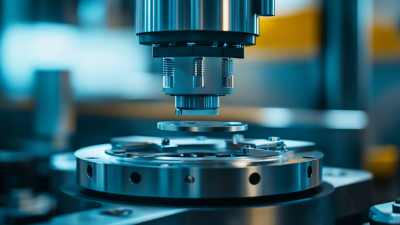 sales@loadcellsensor.com
sales@loadcellsensor.com

5 Proven Weight Sensor Technologies Revolutionizing the Industry
In today's rapidly evolving technological landscape, weight sensors have emerged as a groundbreaking innovation, significantly transforming various industries. These devices play a crucial role in enhancing accuracy and efficiency in applications ranging from manufacturing to healthcare and logistics. Understanding the diverse capabilities and advancements in weight sensor technology can provide businesses with a competitive edge and streamline their operations. In this blog, we will delve into five proven weight sensor technologies that are revolutionizing the industry. We will explore the reasons behind their effectiveness, highlighting how they not only improve measurement precision but also optimize processes, reduce costs, and enhance safety. Join us as we uncover the innovative potential of weight sensors and their impact on modern industry practices.

Impact of Weighing Scale Accuracy on Manufacturing Efficiency: A Data-Driven Analysis
In today's manufacturing landscape, precision is paramount, and the impact of weighing scale accuracy on operational efficiency cannot be overstated. A recent report by the National Institute of Standards and Technology (NIST) highlights that even a minor error of 1% in weight measurement can lead to production losses exceeding $1 million annually for large-scale manufacturers. This emphasizes the need for advanced weight sensor technologies that provide reliable and instantaneous data, enabling companies to minimize waste and optimize resource allocation.
Moreover, an analysis by the International Society of Automation shows that incorporating high-precision weight sensors in automated systems can enhance manufacturing efficiency by up to 15%. The integration of smart weighing technologies allows for real-time monitoring and data analytics, paving the way for proactive adjustments in production processes. This level of accuracy not only improves compliance with industry standards but also ensures better quality control, ultimately fostering stronger customer satisfaction and loyalty in a competitive market. As industries seek to refine their operations, leveraging innovative weight sensor technologies will be crucial for achieving streamlined processes and sustainable growth.
5 Proven Weight Sensor Technologies Revolutionizing the Industry - Impact of Weighing Scale Accuracy on Manufacturing Efficiency: A Data-Driven Analysis
| Technology | Accuracy (%) | Response Time (ms) | Impact on Manufacturing Efficiency (%) | Adoption Rate (%) |
|---|---|---|---|---|
| Strain Gauge Sensors | 0.1 | 50 | 15 | 65 |
| Load Cell Technology | 0.05 | 30 | 20 | 75 |
| Digital Weight Sensors | 0.1 | 20 | 18 | 80 |
| Capacitive Sensors | 0.2 | 60 | 10 | 70 |
| Piezoelectric Sensors | 0.05 | 25 | 22 | 55 |
Emerging Weight Sensor Technologies and Their Effectiveness in Supply Chain Management
In today's rapidly evolving supply chain landscape, emerging weight sensor technologies are playing a pivotal role in enhancing efficiency and accuracy.
These advanced sensors are integrated into various stages of the supply chain, from manufacturing to distribution, ensuring precise inventory management and reducing errors in weight measurements.
With the rise of automation and IoT, weight sensors provide real-time data analytics, enabling companies to make informed decisions and optimize their operations.
Tip: Consider incorporating weight sensor technology into your inventory management system.
By doing so, you can minimize discrepancies and streamline the fulfillment process, ensuring that orders are fulfilled accurately and promptly.
Moreover, the effectiveness of these technologies extends beyond simple weight measurement. Intelligent weight sensors can monitor and track payloads during transportation, enhancing safety and compliance with regulations.
This not only helps in maintaining product integrity but also reduces the risk of overloading, which can lead to costly damages.
Tip: Regularly calibrate your weight sensors to maintain accuracy and prevent potential loss during transit.
This practice will safeguard your assets and improve your overall operational efficiency in the supply chain.
Implementing these innovative weight sensor technologies is crucial for businesses looking to stay competitive in an increasingly data-driven environment.
The Role of Smart Weight Sensors in Enhancing Retail Operations: Key Statistics
The retail industry is undergoing a significant transformation with the advent of smart weight sensors, which play a crucial role in optimizing operations. One significant innovation is the AI smart shelf prototype developed by Mpression, which automates product replenishment. This not only improves stock management but also enhances customer satisfaction by ensuring availability of products. With smart shelves set to reach a market value of USD 21.5 billion by 2032, it’s clear that these technologies are reshaping the retail landscape.

Key statistics reveal that the integration of smart sensors accelerates decision-making processes and provides deep insights into consumer behavior. By utilizing Internet of Things (IoT) capabilities, retailers can monitor inventory levels in real-time, allowing for more efficient restocking strategies. This not only reduces operational costs but also improves the overall shopping experience. As the demand for automation in retail continues to rise, the role of smart weight sensors will become increasingly pivotal in driving sales and enhancing operational efficiency.
Comparative Review of Load Cell Technologies: Performance Metrics and Industry Adoption
The rapid advancements in load cell technologies have transformed the way industries monitor weight and pressure. With several options available, it’s crucial to evaluate their performance metrics and the degree of industry adoption. Strain gauge load cells, for instance, are renowned for their accuracy and reliability, making them a favorite choice in scales and high-precision applications. Capacitive sensors, on the other hand, offer exceptional sensitivity and are increasingly popular in dynamic applications where quick weight changes need to be captured accurately.
**Tip:** When selecting a load cell for your application, consider not only the accuracy but also the environment in which it will be used. Some technologies perform better in specific conditions, such as high humidity or temperature extremes.
Another noteworthy technology is the piezoelectric load cell, known for its ability to measure dynamic loads. This makes it ideal for applications like weighing systems in automotive testing and food processing. Furthermore, the growing adoption of wireless load cells is streamlining operations by providing real-time data transmission, greatly enhancing productivity.
**Tip:** Integrate wireless load cells into your systems to reduce clutter and improve mobility, especially in settings where traditional wired connections may hinder operations.
Innovations in Weight Sensor Integration for IoT: Transforming Data Collection and Analysis
The integration of weight sensor technologies with the Internet of Things (IoT) has sparked a revolution in data collection and analysis across various industries. By embedding weight sensors into IoT systems, businesses can achieve real-time monitoring and tracking of products, leading to enhanced decision-making capabilities. This innovation allows for more accurate inventory management, helping companies reduce waste and optimize supply chains. For instance, smart scales in warehouses can communicate with management software, providing instant updates on stock levels, which enhances overall operational efficiency.
Furthermore, the convergence of weight sensors and IoT paves the way for advanced data analytics. As weight sensor data is collected and transmitted seamlessly through cloud platforms, businesses can leverage big data tools to identify trends and patterns. This capability is particularly beneficial in fields such as logistics, where understanding shipment weights can improve load optimization and reduce transportation costs. Additionally, industries like healthcare and retail are also reaping the benefits, utilizing weight sensors for patient monitoring and customer insights, respectively. The result is a more interconnected world where data-driven decisions are made faster and more accurately, fostering innovation and growth.

Related Posts
-

5 Best Weight Sensors Revolutionizing Industrial Measurements: A Data-Driven Comparison
-

Unlocking Precision: Essential Tips for Choosing the Right Ring Load Cell for Your Needs
-

10 Compelling Reasons to Choose Force Sensors for Your Next Project
-

Explore Cutting-Edge Weight Sensors at the Record-Breaking 137th Canton Fair!
-

Top 10 Pancake Load Cell Manufacturers from China at the 137th Canton Fair
-

Navigating Industry Standards for Best Weight Transducer and Its Challenges

